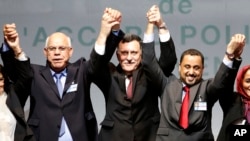Libyan leaders from the country's two rival parliaments signed a national unity agreement in the Moroccan resort town of Skhirat, after a number of final obstacles were worked out. A new prime minister was also named.
The crowd clapped and chanted “Libya, Libya, Libya,” as the deputy speakers of the country's two rival parliaments signed the national unity accord, then embraced and raised their arms in the air together in a gesture of solidarity.
The agreement is an attempt to end the instability that has plagued Libya since the 2011 ouster and death of longtime leader Moammar Gadhafi. It calls for a new unity government within 40 days, with members from the internationally recognized government in Tobruk and the Islamist-backed body in Tripoli.
Morocco's foreign minister, Sala'eddin Mezouar, who presided over the signing ceremony, told the crowd the accord had been concluded amid an atmosphere of optimism, and that Libyans will now begin to apply the agreement, beginning with its security provisions.
Mezouar said Libya is facing internal and external threats it must deal with, and that while it is not ideal, the unity agreement will open the door for the different parties to build Libya's new institutions, and establish security and stability.
Enormous tasks ahead
U.N. Special Envoy for Libya Martin Kobler introduced the head of the country's new unity government, Faez Sarraj, stressing he has a difficult task in front of him.
"I also must say that I don't envy you. There is a heavy workload in front of the government. There is, first, national reconciliation in the country. There is, second, the security situation. There's the problem of terrorism and the fight against Da'esh (Islamic State group). This has to be addressed on an urgent basis," he said.
Kobler went on to insist the United Nations would stand beside the new Libyan government, which will need to deal with the “horrible” humanitarian situation in Benghazi, and the many refugees in various parts of the country. He added the United Nations would help with a reconstruction fund.
Saraj, the new prime minister, thanked the international community for its efforts in bringing together the Libyan parties and urged everyone to cooperate.
He said there is optimism now, but that the upcoming period will require the effort and participation of everyone. He insisted there must be no spirit of victor or vanquished.
Sarraj will head a nine-member governing council, as well as a presidential council that will have the authority to appoint and dismiss ministers.
Saudi-owned al Arabiya TV reported an Italian general would be in charge of overseeing security for the new government as it establishes itself in the capital, Tripoli.
Anticipating the signing, the United Nations, European Union, African Union, Arab League and more than a dozen nations issued a statement Sunday in support of the peace effort.
The statement came after a ministerial meeting in Italy, and included a commitment to Libya's sovereignty, pledges to support the unity government and calls for an immediate cease-fire.
Concerns about Libya’s instability have been heightened in view of signs the Islamic State group that controls parts of Iraq and Syria is attempting to use the unrest to gain ground in Libya.
Libyan Leaders Sign National Unity Deal
update

CAIRO —



